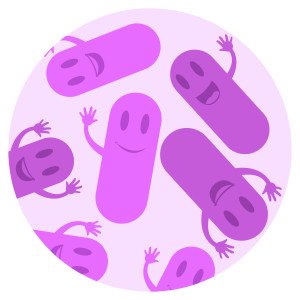Probiotics: Good Bacteria for a Healthy Gut
 What Are Probiotics?Probiotics are living microorganisms that are beneficial to our intestinal tract and immune system. They consist of both bacteria and yeast and occur naturally in our bodies. Their job is to help with the digestion of food, inhibit the overgrowth of unfriendly bacteria, prevent inflammation, and detoxify certain enzymes, hormones, and drugs.Typically, probiotics create a balance in a healthy digestive system. When that balance is off-kilter due to illness, a course of antibiotics, a diet lacking in nutrient-dense foods, or the overgrowth of unfriendly bacteria, gastrointestinal problems can occur.To combat these issues and to bring your body back into bacterial balance, a probiotic supplement can help.How Should I Select Probiotics?As with any supplement, finding a quality source is important in order to have an effective role in your gut health. A quality product has a diverse number of strains of bacteria and yeast. In addition, you should look for a dosage of at least 4 billion live and active organisms per capsule. The probiotics should be packaged in a dark glass bottle or in opaque plastic and have an expiration date. Heat, sunlight, and moisture can kill active bacteria, so it’s important to store them in the refrigerator.There are foods that contain probiotics as well, but there is no guarantee of the amount you are getting. You will find probiotics in fermented foods such as sauerkraut, kimchi, kombucha, and yogurt, but the quality of the probiotics and their viability is unknown.How Can I Use Probiotics?The typical American diet is lacking in many essential nutrients and is chock-full of chemicals, preservatives, and fillers that can cause gastrointestinal issues and inflammation. Taking at least 4 billion colony-forming units (CFUs) per day can combat these problems. Probiotics should be taken with food twice daily and not with a hot liquid (hot liquids will kill the bacteria).Probiotics are considered safe, as they are bio-identical to what already exists in the body. But, as with any drug or supplement, always tell your health care specialists what you are taking. Most importantly, eat a diet that is dense in nutrients and high in fiber; probiotics feed off of fiber and build colonies that will keep your gut in a healthy balance.By Beth Rosen, MS, RD
What Are Probiotics?Probiotics are living microorganisms that are beneficial to our intestinal tract and immune system. They consist of both bacteria and yeast and occur naturally in our bodies. Their job is to help with the digestion of food, inhibit the overgrowth of unfriendly bacteria, prevent inflammation, and detoxify certain enzymes, hormones, and drugs.Typically, probiotics create a balance in a healthy digestive system. When that balance is off-kilter due to illness, a course of antibiotics, a diet lacking in nutrient-dense foods, or the overgrowth of unfriendly bacteria, gastrointestinal problems can occur.To combat these issues and to bring your body back into bacterial balance, a probiotic supplement can help.How Should I Select Probiotics?As with any supplement, finding a quality source is important in order to have an effective role in your gut health. A quality product has a diverse number of strains of bacteria and yeast. In addition, you should look for a dosage of at least 4 billion live and active organisms per capsule. The probiotics should be packaged in a dark glass bottle or in opaque plastic and have an expiration date. Heat, sunlight, and moisture can kill active bacteria, so it’s important to store them in the refrigerator.There are foods that contain probiotics as well, but there is no guarantee of the amount you are getting. You will find probiotics in fermented foods such as sauerkraut, kimchi, kombucha, and yogurt, but the quality of the probiotics and their viability is unknown.How Can I Use Probiotics?The typical American diet is lacking in many essential nutrients and is chock-full of chemicals, preservatives, and fillers that can cause gastrointestinal issues and inflammation. Taking at least 4 billion colony-forming units (CFUs) per day can combat these problems. Probiotics should be taken with food twice daily and not with a hot liquid (hot liquids will kill the bacteria).Probiotics are considered safe, as they are bio-identical to what already exists in the body. But, as with any drug or supplement, always tell your health care specialists what you are taking. Most importantly, eat a diet that is dense in nutrients and high in fiber; probiotics feed off of fiber and build colonies that will keep your gut in a healthy balance.By Beth Rosen, MS, RD


